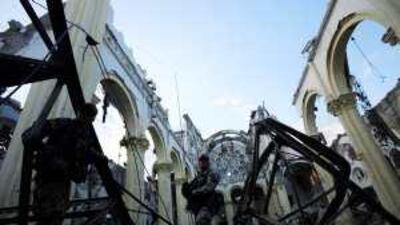PORT-AU-PRINCE // As Haitian troops raised the national flag in front of the crumpled presidential palace on Tuesday, one week after the capital's destruction by an earthquake, residents argued over the future of their homeland.
Apache helicopters touched down in the centre of Port-au-Prince as 11,000 US troops took control of the city, angering nationalist islanders but pleasing others who see their own government as woefully corrupt and incompetent. "The government of Haiti cannot help me, and I cannot help myself," said a jobless Jackson Nicolas, 42. "We were a proud nation - the first black country in the world. But now we cannot do anything for ourselves. This earthquake was our chance to get back to ground zero and rebuild this country, and the presence of the United States is necessary for this."
Amid a makeshift camp of thousands of Haitians left homeless by the earthquake, Mr Nicolas's words angered the patriotic sentiments of the many countrymen who saw hope in their collective ability to overcome a near-apocalypse. "The future of Haiti is in the hands of Haiti," shouted Eddy Michel, 39, an electrician. "We need aid and help from these other countries, but we need the work of ordinary Haitians to get ourselves back on our feet."
Among the mountains of twisted steel and concrete that pockmark Port-au-Prince, residents struggled to address the scale of their loss. It was not just their immediate problems of finding food, water and shelter that concerned them, but how they would find work - and an income - in the troubling months ahead. The vacant lots that have become shantytowns of wooden poles and plastic sheets are filled with Haitians digging in for the long haul, dividing lots in grid-like patterns and building homes from anything salvageable from their levelled houses.
UN officials acknowledge that Haitians have looted supermarkets for food and other supplies, but describe a city in which buses have started running, 23 hospitals are treating the injured and unidentified corpses have been interred in rural mass graves. Food aid is reaching 270,000 people, though a three-fold hike in the price of rice and shortages of petrol are making life difficult for those not receiving the aid. Other residents have fled the city, where more than one-third of buildings were levelled, to find accommodation in the provinces.
A UN radio station in Haiti, known as Minustah, broadcasts news on preventing cholera and evacuating the beleaguered capital. In between, it plays songs by the likes of Tracy Chapman and Bob Marley. Many earthquake survivors are still wearing the clothes they had on at 4.53pm on January 12, their wardrobes buried under the rubble. They gather steel poles, wood and other supplies from flattened buildings and ready themselves for a drawn-out recovery.
Although looting and the threat from armed gangs has been highlighted in the media, among most Haitians there is a remarkable spirit of fortitude and endurance - and of co-operation and community support. "People are co-operating. Nobody has that much to give, but we are sharing," said Eleda Lolo, 45, a beautician and mother of one from the Delmas suburb, who lost her home and now is scrambling to feed herself and her child in a sprawling camp beside St Louis de Gonzague high school.
"We are looking for homes. For jobs," she said. "The government should try and do something to help us with our lives." UN development chiefs agree. They say Haiti needs massive development assistance to foster a lasting recovery. They also emphasise that it was the cheap, sand-filled concrete buildings that caused the massive number of deaths, and that the reconstruction must adhere to much more strict building standards.


